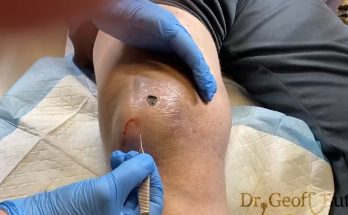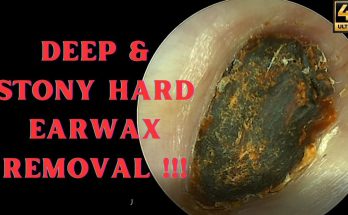We include products we think are useful for our readers. If you buy through links on this page, we may earn a small commission. Here’s our process.
You may be able to treat blackheads around the lips with products containing salicylic acid or retinoids, among others. If home remedies don’t work, you may need a dermatologist.
Blackheads are tiny bumps on the skin. They form when oil, bacteria, and dead skin cells clog pores. Because the pores stay open, the substances are exposed to air. This causes them to darken and look like black dots.
Blackheads are a mild type of acne. They generally appear on the face and forehead, but can also develop on the chest, back, neck, and shoulders.
These bumps may also show up around your lips. This can happen if your hands, hair, or items like phones and pillowcases transfer oil and bacteria to the area. Blackheads can also develop if you don’t wash off makeup and sweat.
If left untreated, blackheads might turn into inflammatory acne. This is because oil and bacteria are allowed to build up.
It’s possible to remove blackheads on lips with home treatments. If these remedies don’t work, you can visit a dermatologist for help.
There isn’t a one-size-fits-all treatment for blackheads. Your results depend on factors like skin type, genetics, and hormonal changes.
However, there are many options to choose from. These treatments work by breaking down oil, bacteria, and dead skin cells in clogged pores.
Salicylic acid
Salicylic acid is a common acne remedy. It reduces oil and removes dead skin cells, which can block pores and cause blackheads.
You can find salicylic acid in over-the-counter (OTC) face washes, creams, gels, ointments, cleansing pads, toners, and scrubs. Each product will include directions on how to use it.
If salicylic acid removes too much oil, your skin might feel dry. Start with a patch test to see how your skin reacts. Allergic reactions are possible, but rare.
Sulfur
Sulfur removes blackheads by unclogging pores. Its antimicrobial properties can also fight acne-causing bacteria.
Typically, sulfur is available as spot treatments. You’ll need to apply it for a specific amount of time. The manufacturer’s directions will indicate how long you should use it.
While sulfur is gentle, it shouldn’t be applied to a large area of your face. Instead, use it on individual blemishes.
Retinoids
For stubborn blackheads, try retinoids. This treatment works by decreasing excess oil and shedding dead skin cells.
Retinoids are made from vitamin A. They work because vitamin A is small enough to penetrate the skin’s lower layers, where it unclogs pores.
This treatment is available as an OTC gel or cream. When using retinoids, follow the manufacturer’s directions. Avoid sun exposure and tanning salons. Retinoids may cause dryness, irritation, and skin peeling.
Lemon juice
Lemon juice is said to treat blackheads. It contains vitamin C, which has antibacterial properties. These benefits may kill acne-causing bacteria, but there isn’t solid research on the effectiveness of lemon juice for blackheads.
You can use lemon juice as an astringent. To do so, combine equal parts fresh lemon juice and water. Add to a cotton ball and apply to your face. Use it sparingly, as astringents can cause dryness.
The acidity of lemon juice may cause irritation, burning, and redness. If you have sensitive skin, do a patch test first.
Honey
Honey is a natural antibiotic. It can fight bacteria that clogs pores and causes blackheads. Honey also releases hydrogen peroxide, a substance that destroys bacteria.
If you have redness, the anti-inflammatory properties of honey may help.
One way to use honey is to make a mask. Apply it to your face with clean fingers. After 10 to 15 minutes, rinse with lukewarm water. For best results, use raw honey.
Tea tree oil
Tea tree oil is a powerful blackhead treatment. It has antimicrobial abilities, so it can kill bacteria that causes blackheads.
Tea tree oil is also potent. It may cause skin irritation, so always dilute it first. One method is to combine 1 to 2 drops of tea tree oil with 12 drops of carrier oil, like grapeseed oil. Apply it to the skin as a moisturizer.
You can also make an astringent. Mix 3 drops of tea tree oil with 2 ounces of witch hazel or water. Apply it to your skin with a cotton ball.
If these remedies cause irritation, you might need to dilute tea tree oil even further.
Witch hazel
Witch hazel is used to control oily skin. It contains plant compounds called tannins. Tannins have astringent properties, so they can reduce oil in clogged pores.
To use witch hazel, soak a cotton ball and apply it to your blackheads. You can also purchase OTC witch hazel ointments.
Witch hazel is generally safe for the skin. If you’ve never used it before, do a patch test first.
Some lip balms contain antibacterial ingredients like tea tree oil or honey. These products may help treat blackheads on lips.
Look for lip balms that are labeled “acne safe.” This will ensure that they don’t worsen your blackheads.
Benzoyl peroxide
Benzoyl peroxide is an OTC acne medication. It can treat blackheads by killing bacteria and unblocking pores.
This treatment is available as washes, creams, or gels. These products also vary in strength, containing anywhere from 2 to 10 percent benzoyl peroxide. However, the stronger the product, the more likely it is to cause irritation.
Always use benzoyl peroxide according to the manufacturer’s directions. To start, use a low strength and avoid applying too much.
Prescription retinoids
For severe acne, a dermatologist may prescribe topical or oral retinoids. Topical prescription retinoids are available as creams or gels. They are stronger than OTC retinoids, but also work by unblocking pores.
Oral isotretinoin (Accutane) is a retinoid in pill form. It destroys bacteria and reduces oil. Like other retinoids, oral retinoids may cause dryness and sun sensitivity.
When using this medication, it’s important to follow your doctor’s instructions.
Prescription antibiotics
Acne can also be treated with prescription antibiotics. These powerful medications can kill acne-causing bacteria in the skin.
You can use topical antibiotics as creams, lotions, or gels. Oral antibiotics, which are taken by the mouth, are typically used with topical creams like benzoyl peroxide.
Taking antibiotics for inflammatory acne may also remove blackheads in the process.
Stronger medications, like oral contraceptives and dapsone gel, are available for more severe forms of acne.
If these remedies don’t work or your blackheads get worse, see a dermatologist. They can recommend other treatments or prescribe stronger medication.
A dermatologist can also use sterile instruments to physically remove blackheads. This is called an acne extraction. It usually isn’t the first choice, though. The procedure can be time consuming and expensive.
Acne is often linked to hormonal changes or genetics, so there isn’t a definitive way to prevent them.
However, there are things you can do to limit blackheads around your lips:
- Wash your face twice daily with mild cleanser and water.
- Don’t pick at blackheads (it will push oil, bacteria, and dead skin cells deeper into the skin).
- Use oil-free makeup and remove it before sleeping or exercising.
- Don’t touch your face.
You can also use the blackhead treatments noted above as preventive remedies.
Blackheads are a form of mild acne. They can appear around the lips when pores are blocked with oil, bacteria, and dead skin cells. Many things can cause blackheads on lips, such as touching your face or forgetting to remove makeup.
Untreated blackheads can turn into inflammatory acne. To treat them, try OTC preparations like salicylic acid or benzoyl peroxide. You may also use remedies like honey, tea tree oil, or witch hazel.
If your blackheads get worse or won’t go away, visit your dermatologist. They can suggest the best treatment for your skin.
How we reviewed this article:
Our experts continually monitor the health and wellness space, and we update our articles when new information becomes available.



Appreciate it for sharing the information with us.
I enjoy looking through and I believe this website got some genuinely utilitarian stuff on it! .
As I web-site possessor I believe the content matter here is rattling great , appreciate it for your efforts. You should keep it up forever! Best of luck.